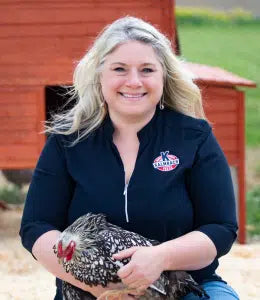As
backyard poultry flocks expand and the types of poultry that we love become more diverse, you may wonder about the unique nutritional requirements of
ducks and geese. Most ducks and geese are omnivores. The vast majority of their nutrition comes from their
duck feed and plant sources. However, they will eat insects, fish, and other small animals typically found around bodies of water.
Unique Nutritional Requirements
Ducks and geese have some unique nutritional requirements when compared to chickens. First, because they are bigger-bodied birds, protein requirements for waterfowl are usually higher in their starter and grower phases. Chicks intended to become layers typically need 18% crude protein in the starter and grower phases. Ducks and geese need about 20-22% crude protein in the starter and grower phases. This higher level of crude protein helps ducks and geese through their major growth spurts in the first few weeks of their life. Just be cautious and aware that you should not overfeed protein. Excessive amounts of protein can cause ducks and geese to grow faster than their skeletal confirmation can handle. This can lead to problems with mobility and is a major contributing factor in the development of angel wing. Another unique nutrient requirement for waterfowl is their need for increased levels of B-vitamins, particularly niacin. Waterfowl are not very good at converting tryptophan, an essential amino acid, into niacin in their natural metabolic process. Niacin is a B-vitamin (B3) and most B-vitamins are used to help convert food into energy. Baby ducks and geese require about 20% more niacin than chicks and that is because waterfowl grow extremely fast! Since these ducks and geese are growing so incredibly fast, niacin plays an active role in proper leg development. Waterfowl that are deficient in niacin may develop leg deformities, bowed legs, and enlarged hocks that can affect how they walk. All of our Kalmbach Feeds®
Duck & Goose feeds,
Flock Feeds and
Meatbird options are formulated with adequate niacin for starting and growing waterfowl. Once waterfowl reach adulthood, they actually have fairly similar niacin requirements compared to other adult
poultry. This means most layer and
maintenance poultry feeds work very well for adult waterfowl, too.
Duck & Geese Eating Behaviors
Since ducks and geese are
waterfowl, it makes complete sense that water plays a huge role in how they eat and digest feed. If you have ever watched a duck or goose eat and drink, they are different from chicks because they will dunk their entire beak – even their entire head – into their water source. Oftentimes, they will move between their feeder and their waterer while eating. Since their beak is wet, moisture is transferred to their feed. Since their feed gets wet and sticky, they need to head back to the waterer to clean their beak! This can be a very messy process but is quite normal for most waterfowl. Another unique thing that you may notice about feeding ducks and geese is they eat pellets very early. Because their bills are bigger than a chick’s beak, most breeds of ducks and geese are able to pick up and eat
pellets from the day they hatch. Pellets help reduce feed waste and minimize the amount of wet feed that sticks to their bills. This can help keep your feeders and waterers just a little bit cleaner. Ducks and geese are also prolific grazers. As soon as my poultry (ducks and geese included!) develop their feathers, I start allowing them to free-range. Ducks and geese will free-range almost exclusively during the day. It is very important that you have ample room for them to root and graze during the day. Of course, areas near water sources – creek banks, ponds, and even small springs – are favorite locations for ducks and geese to graze. Waterfowl can garner a fair amount of their nutrient needs (~10-30%, depending on breed) from foraging. However, providing free-choice access to a
good quality feed along with forage is the best way to keep your waterfowl healthy, productive, and active. Ducks and geese are wonderful additions to any flock. They are hilarious! Watching ducks splash around in the water and waddle around in a big duck herd should be considered premium entertainment. Geese make excellent guardians, and there are even types of geese that specialize in eating only weeds (e.g., weeder geese) from your landscape and gardens. At Kalmbach Feeds®, we love our waterfowl, too! Contact us with any of your questions and follow our
social media pages to see pictures and posts from fellow poultry lovers just like you!

